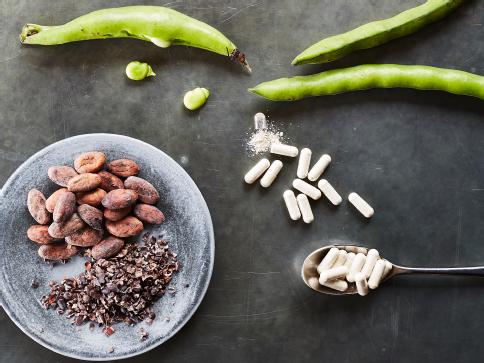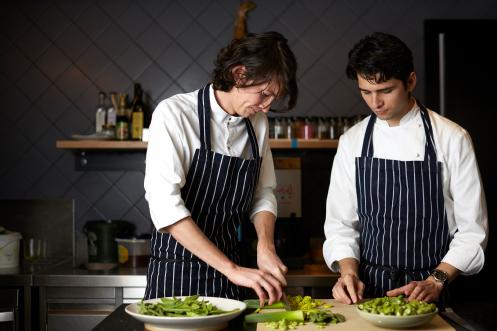Psychoactive supper shines a light on blanket substance ban
 Last night researchers at the University of Warwick hosted a ‘Psychoactive Supper’ to stimulate discussion about the concept of psychoactivity, central to The Psychoactive Substances Act (2016), a new piece of UK legislation that seeks to ban ‘legal highs’ by instituting a blanket ban on all psychoactive substances.
Last night researchers at the University of Warwick hosted a ‘Psychoactive Supper’ to stimulate discussion about the concept of psychoactivity, central to The Psychoactive Substances Act (2016), a new piece of UK legislation that seeks to ban ‘legal highs’ by instituting a blanket ban on all psychoactive substances.
In January 2016, Parliament introduced the Psychoactive Substances Act, which plans to ban the use of all products which affect the central nervous system, except those which are explicitly exempt (i.e. prescription medication, alcohol, caffeine, and nicotine).
For the most part, this law has been portrayed as a pragmatic solution to the growing menace of synthetic cannabinoids and other ‘legal highs’ which have evaded existing drug laws.
In their haste to push through a solution to this serious problem, however, Parliament has failed to listen to a small but important group of voices opposing the ban on the basis of historical and scientific evidence, including their own advisors.
While the Act makes exceptions for substances normally consumed as food, along with traditionally and widely enjoyed psychoactive substances such as caffeine, alcohol and nicotine, the fact remains that from a psychopharmacological standpoint, many common foods activate the same pathways in the brain as illegal drugs. In that sense, where should the line be drawn between food and drugs?
The evening offered a psychoactive food menu featuring ingredients that are perfectly legal under the Psychoactive Substances Act. The dinner was curated by Crossmodal experience designers and culinary experts Daniel Ospina and Charles Michel, and showcased multisensory performances by musicians and visual artists.
The tastings were presented alongside short talks by leading experts in psychopharmacology, the neuroscience of moral behaviour, activists, politicians and opinion-makers.
Dr. Susannah Wilson project lead of Banning Pleasure: Psychoactivity and the Law at the University of Warwick said,
“This symposium aims to stimulate reflection about the scope of the concept of psychoactivity deployed in The Psychoactive Substances Act and about the widely contested approach to drug policy it embodies.”
The Supper took place on Tuesday 17 May 2016 at Carousel in Marylebone, London.
This event is an initiative of Dr. Susannah Wilson, Dr. Oliver Davis and Dr. Rebecca Powers at the University of Warwick, School of Modern Languages and Cultures, with funding from the Arts and Humanities Research Council (AHRC).
AB 18/05/20165
Notes to editors:
Speakers List:
Susannah Wilson
Dr Susannah Wilson is Assistant Professor of French Studies at the University of Warwick and the recipient of several awards, including the British Academy Rising Star Award and the AHRC Cultural Engagement Award. She is currently working on a project which focuses on the question of prohibition across cultures and historical periods.
Michel & Ospina
A duo of Experience Designers with a holistic and cross-disciplinary approach. Ospina and Michel apply insights from psychology, art, philosophy, natural sciences, and management theory to the creation of delicious and meaningful experiences to foster positive change in society.
Molly Crockett
Dr Molly Crockett is Associate Professor of Experimental Psychology and Distinguished Research Fellow at the Oxford Centre for Neuroethics, University of Oxford. She is noted for her work on human morality, altruism and decision making.
Rudi Fortson
Rudi Fortson, QC is a Barrister and Visiting Professor of Law at Queen Mary, University of London. He is noted for his work in relation to serious crime, including fraud, confiscation, asset-recovery, money-laundering, drug trafficking and drug law.
David Nutt
Prof David John Nutt DM FRCP FRCPsych FMedSci is a psychiatrist and neuropsychopharmacologist specialising in the research of drugs that affect the brain and conditions such as addiction, anxiety, and sleep.
John Ramsey
Dr John Ramsey is an analytical toxicologist at St. George’s, University of London. He has a long-standing interest in detecting the appearance of new compounds in recreational drugs.
Jonathan Cave
Dr Jonathan Cave is a Senior Tutor in Economics at the University of Warwick. He has published extensively on drug policy and serves as a member of the UK government Regulatory Policy Committee, although he is not speaking in that capacity.
Stuart Walton
Stuart Walton is a cultural historian and critic. Two of his most famous works - Intoxicology: A Cultural History of Drinks and Drugs (reprint 2016) and A Natural History of Human Emotions (2004) - have been translated into seven languages. His latest, In The Realm of the Senses, came out in February.
Ophelia Deroy
Dr Ophelia Deroy is Co-Founder of CREATE and Associate Director of the Institute of Philosophy, University of London. She specialises in the Philosophy of Mind and Cognitive Neuroscience.
Yewande Okuleye
Yewande Okuleye FRSA is a PhD candidate in history at the University of Leicester. She is researching the re-medicalisation of cannabis. Yewande applies her interdisciplinary background in science and art to create opportunities for the public to reflect on the narratives of biomedicine.
The menu:
First course: Cacao Ceremony
Bitter and warm drink, containing 50gr of pure raw cocoa per serving,chilies, honey and spices
Contains anandamide, theobromine, caffeine, phenylethylamine, and tryptophan.
Main course: Levodopa (L-dopa) Soup
Creamy velouté made of broad beans (seeds and pods) and truffle oil
Contains a high concentration of L-dopa
Cheese: Raw milk Camembert and salad, generous quantities of nutmeg
Contains myristicin
Dessert: Crossmodal Illusion/Hallucination
Sichuan pepper solution and lemongrass fruit mousse
Contains Hydroxy alpha sanshool
Alex Buxton
Communications Manager
Tel: 02476 150423
Mob: 07876 218166
a.buxton.1@warwick.ac.uk
Read more on the project website:

